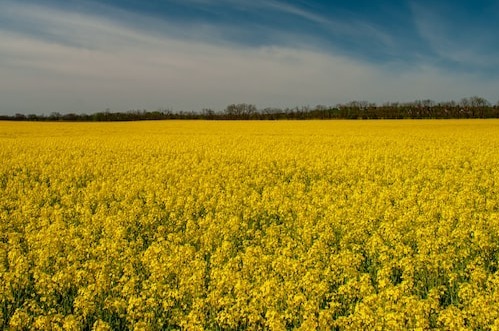W20: Canola & Rapeseed Update

In W20 in the canola landscape, all oilseeds experienced losses on the global stock exchanges. The August rapeseed futures on the Paris stock exchange declined 2.1% to USD 445.97/MT on May 12, a drop of 51% YoY, while Canadian canola dropped 1.5% to USD 812.50/MT, a drop of 36.7% YoY. August rapeseed futures on Euronext decreased 3% in W20 to USD 435/MT, the lowest price since July 2021. In Ukraine, rapeseed futures prices remain at a low level of USD 320-330/MT due to uncertainty with the operation of Black Sea ports after July 18 and low demand from exporters. Rapeseed prices on the Rotterdam Stock Exchange dropped 10% in two weeks to reach USD 900/MT in W20 due to reduced demand from the biofuels industry, while prices ranged between USD 1,160-1,180/MT in early February. For the 2023/24 season, the USDA forecasts a decrease in the global rapeseed harvest by 0.23MMT to 87.06MMT. Rapeseed production YoY is expected to grow in both the EU by 964K MT to 20.5MMT and Canada by 1.3MMT to 20.3MMT. This partly offsets the lower rapeseed production from Australia, after 3 years of exceptional weather conditions, and Ukraine, which is expected to fall by 0.35MMT to 3.15MMT. EU rapeseed imports between July 1, 2022, to May 14, 2023, increased by 44% to 6.92MMT. Australia supplied the most, at 3.2 MMT, with a 43% YoY rise in supply, followed by Ukraine, at 2.9 MMT. However, EU rapeseed imports fell to 129K MT in the second week of May, down more than a third from the previous week.
In 2023, German farmers are planting less winter wheat and more rapeseed, with sowings for the crop increasing by 7.6% to 1.16M hectares. Rapeseed has been sown on over 1.7K hectares of land in 12 Transbaikalia regions in Russia. Moldovan farmers declared their readiness to start an indefinite protest on June 7 if the government does not provide assistance and prohibit the import of Ukrainian wheat, corn, rapeseed, and sunflower from Ukraine. On the other hand, leading agricultural associations in Ukraine have appealed to the head of the EU delegation to urgently unblock the export of Ukrainian agro-food and remove obstacles to its import and transit to the EU. The EU Regulation approved was meant to limit the unilateral ban on Ukrainian agricultural product imports to a ban consisting of only four products from Ukraine, including wheat, maize, sunflower, and rapeseed. However, some EU countries do not fulfill the agreements and continue to delay the import and transit of agricultural products from Ukraine in various ways.




